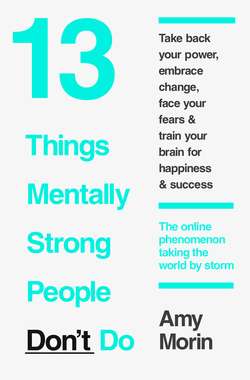Читать книгу 13 Things Mentally Strong People Don’t Do - Amy Morin, Amy Morin - Страница 14
Replace thoughts that Encourage Self-Pity
ОглавлениеI once witnessed a fender bender in a grocery store parking lot. Two cars were backing up at the same time and their rear bumpers collided. The collision appeared to cause only minor damage to each vehicle.
I watched as one driver jumped out of his vehicle and said, “Just what I needed. Why do these things always happen to me? As if I didn’t already have enough to deal with today!”
Meanwhile, the other driver stepped out of his vehicle shaking his head. In a very calm voice he said, “Wow, we’re so lucky that no one got hurt. What a great day it is when you can get into an accident and walk away from it without a single injury.”
Both men experienced the exact same event. However, their perception of the event was completely different. One man viewed himself as a victim of horrible circumstance while the other man viewed the event as good fortune. Their reaction was all about their differences in perception.
You can view the events that happen in your life in many different ways. If you choose to view circumstances in a way that says, “I deserve better,” you’ll feel self-pity often. If you choose to look for the silver lining, even in a bad situation, you’ll experience joy and happiness much more often.
Almost every situation has a silver lining. Ask any kid what the best part about having divorced parents is and most of them will say, “I get more presents at Christmas!” Obviously, there isn’t much good that arises from divorce, but getting twice as many presents is one small aspect of divorce that some kids rather enjoy.
Reframing the way you look at a situation isn’t always easy, especially when you’re feeling like the host of your own pity party. Asking yourself the following questions can help change your negative thoughts into more realistic thoughts:
• What’s another way I could view my situation? This is where the “glass half empty or glass half full” thinking comes in. If you’re looking at it from the glass-half-empty angle, take a moment to think about how someone looking from a glass-half-full perspective might view the same situation.
• What advice would I give to a loved one who had this problem? Often, we’re better at handing out words of encouragement to other people rather than to ourselves. It’s unlikely you’d say to someone else, “You’ve got the worst life ever. Nothing ever goes right.” Instead, you’d hopefully offer some kind words of assistance such as, “You’ll figure out what to do, and you’ll make it through this. I know you will.” Take your own words of wisdom and apply them to your situation.
• What evidence do I have that I can get through this? Feeling sorry for ourselves often stems from a lack of confidence in our ability to handle problems. We tend to think that we’ll never get through something. Remind yourself of times when you’ve solved problems and coped with tragedy in the past. Reviewing your skills, support systems, and past experiences can give you an extra boost of confidence that will help you stop feeling sorry for yourself.
The more you indulge in thoughts that willfully delude yourself about your situation, the worse you’ll feel.
Common thoughts that lead to feelings of self-pity include things such as:
• I can’t handle one more problem.
• Good things always happen to everyone else.
• Bad things always happen to me.
• My life just gets worse all the time.
• No one else has to deal with this stuff.
• I just can’t catch a break.
You can choose to catch your negative thoughts before they spiral out of control. Though replacing overly negative thoughts with more realistic ones takes practice and hard work, it’s very effective in decreasing feelings of self-pity.
If you think, Bad things always happen to me, create a list of good things that have happened to you as well. Then, replace your original thought with something more realistic like, Some bad things happen to me, but plenty of good things happen to me as well. This doesn’t mean you should turn something negative into an unrealistically positive affirmation. Instead, strive to find a realistic way to look at your situation.
